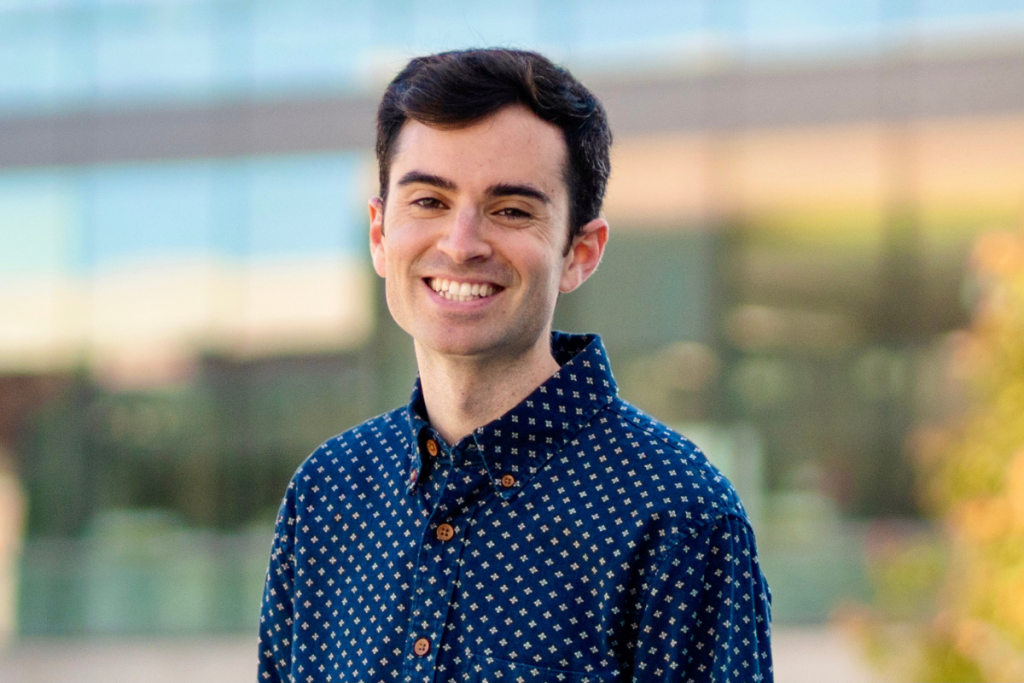Pharmacological Sciences PhD Student Spotlight: Brandon Latifi

UC Irvine’s PhD in pharmacological sciences program provides a unique opportunity for those interested in any scientific discipline represented by the pharmaceutical sciences faculty to have a year of broad, interdisciplinary training and extensive lab rotations followed by focused doctoral research in the pharmaceutical sciences research group of their choice.
Students can choose from one of three tracks within the program: pharmaceutical sciences, pharmacology or medicinal chemistry.
PhD student, Brandon Latifi, shares his experience at UCI and his research interest in developing RNA optogenetic tools to regulate RNA translation.
Q: What year are you in your program and who is your academic advisor?
I am a 5th year PhD candidate in Dr. Andrej Lupták’s lab.
Q: What research are you working on?
My projects are focused on developing RNA optogenetic tools to regulate RNA translation. Specifically, I’m working on creating a riboswitch-based optogenetic tool to reversibly regulate mRNA translation. Evolving functional RNAs that recognize a specific conformation of photo-isomerizable molecules allow for light inducible regulation of translation because the aptamer domains will not have an affinity for the other photo-isoform.
In creating this system, we can utilize light as a non-invasive tool to regulate RNA translation by simply isomerizing our compound. Furthermore, functional RNAs (e.g., aptamers) that recognize a specific photo-isomer can be engineered to create optogenetic tools. However, identifying regions within heterogenous RNA pools that are responsible for binding can be daunting because there are no known high-throughput platforms to accommodate this task. To further develop other optogenetic tools, I’m creating a high-throughput platform to allow for easy identification of functional RNA domains.
Q: What is your research’s significance?
Optogenetic tools have primarily focused on utilizing light responsive proteins to provide high spatial and temporal control over biological events. However, there is a lack of optogenetic tools available to study reversible RNA-level events.
Current optogenetic RNA toolsets rely on irreversible reactions, which can be damaging to the cell and are incapable of capturing rapid dynamics (on/off) of RNA-level molecular events. Therefore, my project aims to address these limitations by creating a system where we can reversibly control expression by simply using light as an orthogonal trigger. In developing this system, we can utilize visible light to control translation and avoid cytotoxicity typically displayed with UV light systems.
Q: What is your favorite part of your research lab?
Working in the Lupták lab is great! Our lab is very multidisciplinary, which allows us to have exposure to a wide variety of projects. Because of this opportunity, we gain knowledge in other areas of research besides our individual projects. More importantly, since we have an array of students from different research backgrounds, we can leverage everyone’s experience to come up with new ideas and further develop our projects.
Q: How has your experience in your PhD program at UCI contributed to your growth?
UCI has provided many opportunities to grow as a scientist. UCI offers many professional development programs, such as Graduate Professional Success for PhD student sand Postdocs in Science, Technology, Engineering, and Mathematics (GPS-STEM), which aim to develop scientists into skilled professionals who will succeed in their chosen career. It has given me opportunities to hear and learn about careers I can purse with my degree, but more importantly, I use their network to connect with other scientists in pharmaceutical companies to learn more about their career trajectories and success in their field.
Within the pharmaceutical sciences department, I co-founded a mentoring program that strives to ensure the success of each graduate student. The program’s success stems from graduate students wanting to mentor and build a supportive community. Developing this program has provided me with the expertise of what it truly means to become an effective mentor.
Q: What do you plan to do after earning your PhD?
After earning my PhD, I plan to pursue a career in the pharmaceutical industry. I would like to leverage the experience and knowledge that I have gained within the department and apply that to help identify novel targets to address current unmet medical needs.